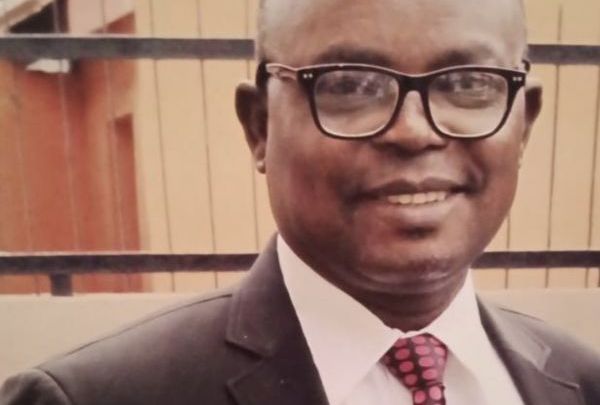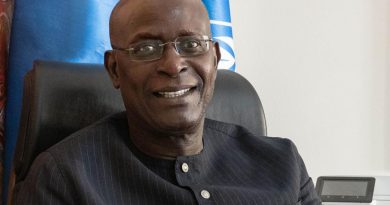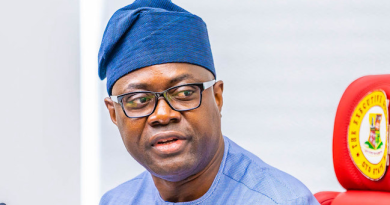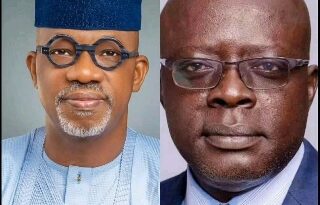Between Lere Olayinka And Rufai Oseni…By Bolanle BOLAWOLE
turnpot@gmail.com 0705 263 1058
“What is the difference between journalists on one hand and broadcasters, presenters, radio and television personalities, news anchors and talk-show hosts on the other?” You must be familiar with the controversy – indeed, name-calling and abusive tirade – between ARISE TV presenter, Rufai Oseni, and the Senior Special Adviser on Public Communications and Social Media to the FCT Minister, Nyesom Wike, in the person of Olalere (Lere) Olayinka on the issue of who is a journalist and who is not, among other controversies in which the two media personalities are enmeshed. I came across another salvo fired from both sides a few days ago and I began to wonder whether there must not be an end to such mud-slinging that casts a slur on both men, demeans the profession(s) to which they belong, and ridicules the organizations/personalities they represent or speak for. Shorn of its gutter language and the altercations that not only foul the air but also distract attention from the critical issues of media practice, the question of who is a journalist and who is not that has been raised remains germane all the same. There are two broad angles to the controversy. The first angle is: Who is a journalist? Is it only those who went to journalism school or such other schools to read and get journalism certificates? Is there anything called on-the-job-training in journalism? I think the controversy has been resolved that both are acceptable: formal training within the four walls of a school and on-the-job-training within the four walls of a media organization. The second angle of the controversy is whether news/personality presenters and broadcasters on radio, television and such other media are also journalists. A few days ago, I came across a post online which attempts to answer that question and I bring it here today for our perusal and interrogation. Enjoy it! Not all On-Air-Personalities are journalists Titled “Broadcaster is not a journalist: The Ibadan media confusion” and written by Olabode Makinwa, it posits thus: “I have watched, with deep concern, how the lines between journalism and broadcasting are being carelessly blurred in Ibadan. As someone who has devoted years to the practice of investigative journalism, I cannot stay silent while many On-Air Personalities (OAPs) parade themselves as journalists simply because they hold a microphone or sit in a studio. “Let me state it plainly: a journalist is trained to gather, verify, analyze, and report facts. My work as a journalist begins long before I speak into a microphone. It takes research, interviews, (review of) documents, and a constant weighing of truth against falsehood. That is what journalism is – service to the public through truth. A broadcaster, on the other hand, is a presenter. He or she may read news, play music, anchor programs, or entertain listeners. Broadcasting is about delivery. Journalism is about content. Both are important, but they are not the same. “The problem in Ibadan today is that many presenters who specialize in banter, slang, and social media virality now call themselves ‘journalists’. They are not. I say this with all sense of responsibility: if you have not gone through the rigors of news gathering, fact-checking, and ethical reporting, then, you are not a journalist. You are a broadcaster, and there is dignity in that role. “What worries me most is the damage this confusion causes. When broadcasters misrepresent themselves as journalists, the public begins to doubt the credibility of real journalism. Sensationalism takes the place of facts. Noise replaces truth. And the noble profession I belong to is dragged into ridicule. “I am not against broadcasters. I work with them daily, and I respect their craft. But they must respect mine, too. A journalist digs out the story; a broadcaster delivers it. Neither should wear the other’s title without merit. “If Ibadan wants to retain its reputation as Nigeria’s media hub, it must correct this error. Broadcasters should embrace their role proudly, and those who desire to be journalists must get the training and discipline the profession demands. “I owe it to my profession – and to the public that depends on it – to keep saying this: a broadcaster is not automatically a journalist. The earlier Ibadan’s media practitioners accept this truth, the better for us all.” Journalism: Fighting intrusions, invasions, and pollutions I thank the writer of this piece, Olabode Makinwa, for this exposition. I thank him for his use of words and choice of language. He was tempered. He was courteous, even respectful. Without being immodest and without taking anything away from the personality and professionalism of my friend and brother, Lere Olayinka, and TV icon, Rufai Oseni, I commend Makinwa’s approach to both men. Rufai I have not met or related with but Lere I enjoyed a very cordial working relationship with during the latter part of Ayo Fayose’s second coming as governor of Ekiti state. But Makinwa need be told that the confusion he spoke about here does not pertain only to Ibadan but is everywhere virulent. More than those he called On-Air-Personalities, social media “journalists” are a worse menace to the journalism profession today. Anyone with an android phone is a “journalist” in the Nigeria of today! So also anyone who can string together a few sentences, correct or incorrect! Anyone who can register an online platform or who only worked in the advertisement, circulation, purchasing or such other sundry departments in a media organization today present and pride themselves as “journalists”. Many are the half-baked “journalists” who parade the profession today – those who did not spend enough time to properly learn the ropes before graduating prematurely to afflict the society with their yellow, fake, and jeun-jeun (brown envelope) journalism!Such elements are to be found in every profession, but that does not mean we must condone their nefarious activities, protect their practice, or turn a blind spot to the danger they pose not only to the journalism profession and journalists as a whole but to society at large. There was a time when a dichotomy existed between lawyers in the academics and those in legal practice, when only the latter were deemed to be qualified for the exulted position of the Senior Advocate of Nigeria (the Silk, as they are called). That dichotomy has been erased and professors of Law now regularly are conferred the title of Senior Advocate of Nigeria along with their learned friends in legal practice. I do not know whether a similar dichotomy exists between journalism teachers who have never engaged in journalism practice and their “students” who engage in practice. Do such trainers of journalists also qualify to be called journalists? What is your profession? A situation arose in Union Bank during the tenure of GAT Oboh as Group Managing Director that hastened the voluntary retirement of my friend and benefactor, Kabir Dangogo, from the bank. The Management came up with a new regulation that mandated those in other ancillary departments, such as Corporate Affairs (manned principally by journalists) to also acquire banking training. Kabir kicked against it. If he had wanted to be a banker, he would have toed that line from Day One. His first and only love was journalism and he would not veer from it! That was what he told those of us his friends who tried to convince him to give the policy a trial. He resigned in 2005 as the Assistant General Manager (Corporate Affairs) rather than train to become a banker. Now, can journalists in the Public Relations or Corporate Affairs departments of banks and other financial institutions parade themselves as bankers? In like manner, can those who work in ancillary departments other than the Editorial department in media organizations describe themselves as journalists?
Like earlier said, this “confusion” is not limited to Ibadan or journalism practice alone. Each time I see friends and colleagues that we read History or Political Science together as a course in the university at graduate or post-graduate level describe themselves as “Historians” or “Political Scientists”, I wonder if we really are! Are we an authority in the field in question? Are we practicing and making our living in the specific field? Whereas I studied History as a course at the undergraduate level at the then University of Ife, I do not regard or address myself as a “historian” because I am not an authority in that field and I do not also make a living through it. Whereas I also studied Political Science at the University of Ibadan at the postgraduate level, was duly certificated, and I am still pursuing a higher degree in that discipline, I do not see or address myself as a political scientist for the same reason that I am not an authority in the field and do not also make a living through it. Conversely, whereas I did not study journalism within the four walls of a school but trained on-the-job beginning in 1985 and have traversed the various gamut of news gathering and reporting, news editing, features writing, newspaper production and Management at the highest level, I consider and address myself as a journalist because, with every sense of modesty, I am an authority – and leading light – in the profession. It is also where I earn my living. Can any On-Air-Personality so interested also become a journalist? Yes, if such a person acquires the training either in a formal school setting or in a recognized media organization. Like Makinwa said, “those who desire to be journalists must get the training and discipline the profession demands.” If you are not a journalist today, can you become one tomorrow? Yes! Just get the requisite training and experience. Is it all On-Air-Personalities that are non-journalists? Not necessarily! You may train as a journalist but choose to be a newscaster, presenter or personality show person because you have a flair or passion for it; you have the stage carriage/presence, as they call it, a good voice, pretty face, etc. Sheathe your sword! Let everyone therefore keep to his or her lane! And let an end come to the needless altercations between Lere and Rufai! Or what do you think? FEEDBACK Thanks for the logical articulation of your usually stimulating articles. Yours on “Vested interests trump justice” is another riveting story told with journalistic rigors! As a reporter myself, I find it curious that no one has asked a pilot or the Pilots Association or Union, assuming there is one, what informs the constant instruction for passengers to switch off their phones. Google can’t be a pilot, no matter how authoritative we think the search engine is over all subjects under the sun. Going to the right source is the plank on which journalism is founded. All the speculations on Airplane mode, modern technology etc. are misplaced if we can’t ask those who fly the planes the essence of the instructions they regale us with on every flight. Secondly, it is curious that no one has interrogated the rationale behind Keyamo’s premature intervention in a matter that should have been settled by the system and not by an individual. I have seen many instances of passengers all over the world being sanctioned for flouting aviation regulations, but not in a single case has a Minister been the one to settle the matter. The system works in such circumstances because that is what systems are meant to do. If the Nigerian system is broken, a ministerial directive will not fix it, but can only break it further. If an illegality occurred, it is the Attorney-General that should statutorily provide a steer, if the regulatory agencies (NCAA, FAAN etc.) were befuddled for any reason. Being a lawyer and a SAN does not confer Keyamo any right to intervene in acts deemed infractions to rules, regulations and procedures, especially when such have been filed in a court of competent jurisdiction. It would have been proper if he had allowed the Attorney-General to do his work. Well, this is Nigeria where “vested interests trump justice”! – Wole Agunbiade, Ph. D. Former editor of PUNCH newspapers, Chairman of its Editorial Board and Deputy Editor-in-chief, BOLAWOLE was also the Managing Director/Editor-in-chief of The Westerner news magazine. He writes the ON THE LORD’S DAY column in the Sunday Tribune and TREASURES column in New Telegraph newspaper on Wednesdays. He is also a public affairs analyst on radio and television.




